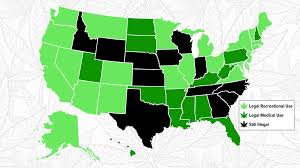States Legalizing Weed, The landscape of cannabis legislation in the United States has undergone a significant transformation over the past few years, with an increasing number of states legalizing weed for both recreational and medicinal use. This shift reflects changing public attitudes toward cannabis, fueled by a growing body of research highlighting its potential benefits and reduced concerns about its harms. As of now, more than half of U.S. states have embraced some form of legalization, signaling a pivotal moment in the nation’s relationship with cannabis.
A Brief History of Cannabis Legalization
The push for cannabis legalization began in the late 20th century, primarily as a response to the growing awareness of the negative social impacts of the War on Drugs. The first significant milestone came in 1996 when California legalized medical marijuana. This move paved the way for other states to follow suit, and by the early 2020s, numerous states had enacted similar laws.
The momentum for recreational legalization gained traction in the 2010s, starting with Colorado and Washington in 2012. These states were pioneers, setting the stage for a wave of legalization efforts across the country. As of now, states like Oregon, California, and Illinois have joined the ranks of those permitting adult-use cannabis, reflecting a broader acceptance of the plant.
Reasons Behind Legalization
Several factors contribute to the trend of states legalizing weed:
- Public Opinion: Surveys consistently show that a majority of Americans support cannabis legalization. This shift in public opinion has pressured lawmakers to reconsider outdated policies and embrace more progressive legislation.
- Economic Benefits: Legalizing cannabis presents significant economic opportunities. States that have legalized weed report increased tax revenues, job creation, and tourism growth. The cannabis industry has emerged as a lucrative sector, attracting investments and generating billions in sales.
- Criminal Justice Reform: Legalization is often seen as a crucial step toward addressing the racial disparities and injustices stemming from past cannabis prohibition. Many advocates argue that legalization can help rectify the harm caused by criminalizing cannabis use, especially in marginalized communities.
- Health and Wellness: The medicinal benefits of cannabis are increasingly recognized, with many states allowing its use for various health conditions. Research suggests that cannabis can alleviate chronic pain, reduce anxiety, and even support patients undergoing chemotherapy.
The Current State of Legalization
As of now, states like New York, New Jersey, and Virginia have legalized recreational marijuana, adding to the growing list of jurisdictions embracing cannabis. Meanwhile, states such as Florida and Texas have implemented more restrictive medical cannabis laws, signaling that the road to full legalization can vary significantly.
However, challenges remain. The federal government still classifies cannabis as a Schedule I substance under the Controlled Substances Act, creating complications for states and businesses operating in the cannabis industry. This federal-state conflict complicates banking, taxation, and interstate commerce.
The Future of Cannabis Legalization
The trend of states legalizing weed shows no signs of slowing down. As public support continues to rise and more research emerges on the benefits and risks of cannabis use, it’s likely that additional states will consider legalization in the coming years. Furthermore, discussions around federal legalization are gaining traction, which could provide a uniform framework for cannabis policy across the nation.
In conclusion, the movement toward legalizing weed reflects broader societal changes and a growing recognition of cannabis’s potential benefits. As more states continue to legalize cannabis, the conversation will inevitably evolve, paving the way for a more comprehensive understanding and acceptance of cannabis in American society. The future of cannabis legalization is bright, with the potential for transformative impacts on health, economy, and social justice.
You Might Also Like These:



